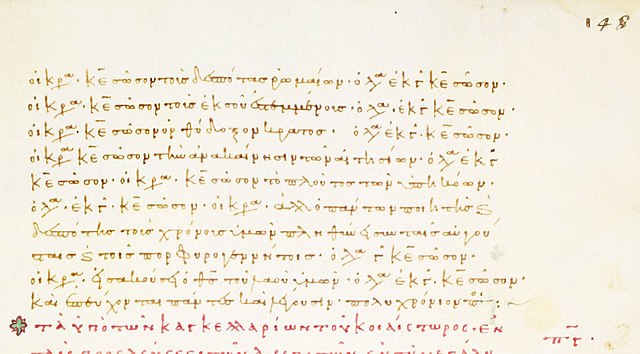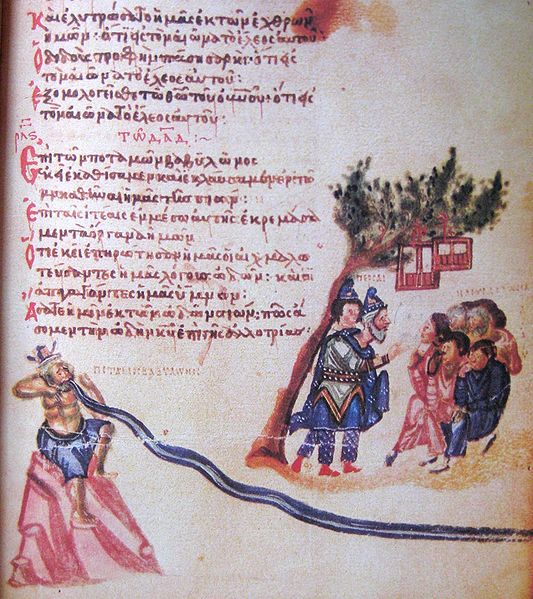Echos is the name in Byzantine music theory for a mode within the eight-mode system (oktoechos), each of them ruling several melody types, and it is used in the melodic and rhythmic composition of Byzantine chant, differentiated according to the chant genre and according to the performance style. It is akin to a Western medieval tonus, an Andalusian tab', an Arab naġam, or a Persian parde.
Intonation according to Erotapokriseis and standard intonation of echos protos: "You descend 4 steps [φοναὶ] from the echos protos [kyrios protos/authentic protus] and you will find again the plagios protos, this way"
Intonation according to Erotapokriseis and standard intonation of echos devteros: "You do the same way in echos devteros. If you descend 4 steps to find its plagios, i.e. πλ β', thus"
"Parallage of John Koukouzeles": The four peripheral wheels for the Octoechos (top left: protos echoi; top right: devteros echoi; bottom left: tritos echoi; bottom right: tetartos echoi) and the tetraphonic tone system and its transpositions in the center—Koukouzelian wheel in an 18th-century manuscript (manuscript of the private collection by Demetrios Kontogiorges)
Intonations (ἐνηχήματα) for the echoi plagios devteros, varys, and plagios tetartos listed in a 17th-century papadike treatise—the intonations are followed by chant incipits (London, British Library, Harley 5544, fol. 8r)
Byzantine music originally consisted of the songs and hymns composed for the courtly and religious ceremonial of the Byzantine Empire and continued, after the fall of Constantinople in 1453, in the traditions of the sung Byzantine chant of Eastern Orthodox liturgy. The ecclesiastical forms of Byzantine music are the best known forms today, because different Orthodox traditions still identify with the heritage of Byzantine music, when their cantors sing monodic chant out of the traditional chant books such as the Sticherarion, which in fact consisted of five books, and the Irmologion.
Acclamation during the Louperkalia feast (15 February) at the hippodrome according to the Book of Ceremonies, book I chapter 82 (D-LEu Ms. Rep I 17, f.148r)
Chludov Psalter, 9th century (RUS-Mim Ms. D.129, fol. 135) River of Babylon as illustration of Ps. 137:1–3
Chludov Psalter, beginning of the canticles
Recitation of Psalm 85 κλῖνον, κύριε, τὸ οὖς σου καὶ ἐπάκουσόν μου "on Monday evening" (τῇ β᾽ ἑσπερ) in echos plagios devteros with a preceding troparion καὶ ἐπάκουσόν μου· δόξα σοι, ὁ Θεός in a liturgical manuscript around 1400 (GR-An Ms. 2061, fol. 4r)

![Intonation according to Erotapokriseis and standard intonation of echos protos: "You descend 4 steps [φοναὶ] from the echos protos [kyrios protos/auth](https://upload.wikimedia.org/wikipedia/commons/thumb/a/a4/Enechemata_%28%E1%BC%A6%CF%87%CE%BF%CF%82_%CF%80%CF%81%E1%BF%B6%CF%84%CE%BF%CF%82%2C_%E1%BC%A6%CF%87%CE%BF%CF%82_%CF%80%CE%BB%CE%B1%CE%B3%CE%B9%CE%BF%CF%82_%CF%84%CE%BF%E1%BF%A6_%CF%80%CF%81%CF%8E%CF%84%CE%BF%CF%85%29.jpg/640px-Enechemata_%28%E1%BC%A6%CF%87%CE%BF%CF%82_%CF%80%CF%81%E1%BF%B6%CF%84%CE%BF%CF%82%2C_%E1%BC%A6%CF%87%CE%BF%CF%82_%CF%80%CE%BB%CE%B1%CE%B3%CE%B9%CE%BF%CF%82_%CF%84%CE%BF%E1%BF%A6_%CF%80%CF%81%CF%8E%CF%84%CE%BF%CF%85%29.jpg)






